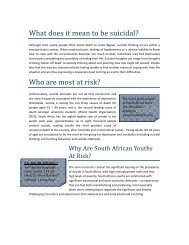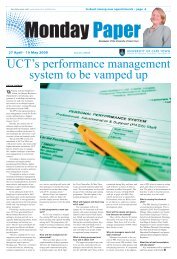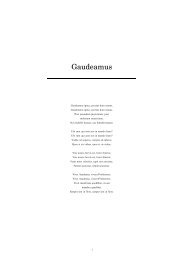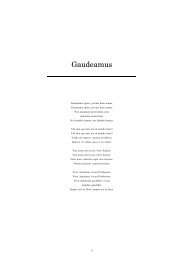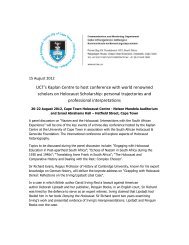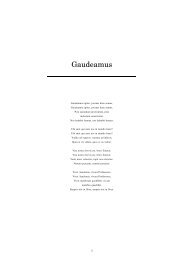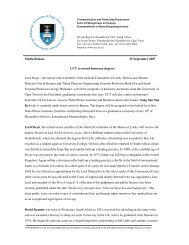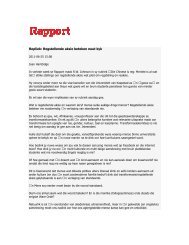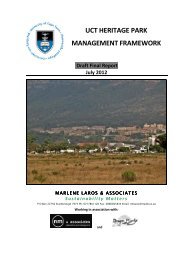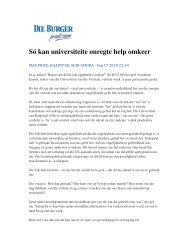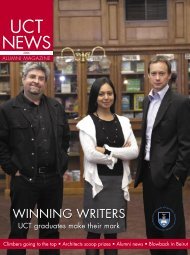INSTITUTIONAL PLANNING DEPARTMENT - University of Cape Town
INSTITUTIONAL PLANNING DEPARTMENT - University of Cape Town
INSTITUTIONAL PLANNING DEPARTMENT - University of Cape Town
Create successful ePaper yourself
Turn your PDF publications into a flip-book with our unique Google optimized e-Paper software.
Volume 4 Issue 2<br />
FEBRUARY 2012<br />
<strong>INSTITUTIONAL</strong><br />
<strong>PLANNING</strong> <strong>DEPARTMENT</strong><br />
U P D A T E O N K N O W L E D G E C O - O P P I L O T P R O J E C T<br />
T<br />
he UCT Knowledge Co-op<br />
acts as an avenue for external<br />
constituencies to access<br />
the resources and pr<strong>of</strong>essional<br />
expertise within the university<br />
around problems they experience.<br />
Based in the Institutional Planning<br />
department it draws on expertise<br />
from all faculties.<br />
The facility was <strong>of</strong>ficially launched<br />
on 22 August. Some 100 guests<br />
representing community groups,<br />
academics and a few students attended<br />
the event.<br />
The programme introduced the<br />
Knowledge Co-op by showcasing<br />
some <strong>of</strong> the projects underway<br />
through the experiences <strong>of</strong> these<br />
different stakeholder groups as well<br />
as the project manager. The <strong>University</strong>‟s<br />
expectations and perspective<br />
were reflected by Vice Chancellor<br />
Max Price and two <strong>of</strong> his deputies,<br />
Pr<strong>of</strong> Crain Soudien and Pr<strong>of</strong> Danie<br />
Visser. (See<br />
(http://www.uct.ac.za/mondaypaper<br />
/?id=8763 for a detailed report.)<br />
INSIDE THIS ISSUE:<br />
Postgraduate Cohort 2<br />
Teaching & Learning<br />
Internship<br />
Rhythm Generation<br />
Student Quality Forum<br />
2<br />
3<br />
3<br />
4<br />
BARBARA SCHMID — PROJECT MANAGER<br />
During 2011 the first round <strong>of</strong> ten projects<br />
were conducted. The topics ranged from difficulties<br />
in adhering to anti-retroviral treatment to<br />
conditions for starting as an entrepreneur in<br />
<strong>Cape</strong> <strong>Town</strong>; they examined exit models for prostituted<br />
women and the design for low-cost fencing<br />
or an electronic database.<br />
With most <strong>of</strong> the 2011 projects completed we<br />
are looking for students to take up some <strong>of</strong> the<br />
over 30-project ideas submitted to the Co-op by<br />
a variety <strong>of</strong> new community partners.<br />
S A A I R F O R U M<br />
O<br />
ne <strong>of</strong> IPD‟s highlights in 2011 was<br />
acting as the host <strong>of</strong> the eighteenth<br />
annual Southern African Association<br />
for Institutional Research (SAAIR)<br />
Forum which took place from 11-13 <strong>of</strong> October<br />
at the Milnerton lagoon beach hotel.<br />
This year‟s theme was „enhancement‟ - designed<br />
to provide opportunities for critical selfreflection<br />
for institutional researchers, planners,<br />
quality assurance pr<strong>of</strong>essionals, administrators<br />
and academics, on how evidencebased<br />
practices can be used to improve the<br />
quality <strong>of</strong> teaching practice and graduate attributes.<br />
The key note speakers included: Dr Saleem<br />
Badat, Vice-Chancellor <strong>of</strong> Rhodes <strong>University</strong>;<br />
Pr<strong>of</strong> Ge<strong>of</strong>f Scott, Pro Vice-Chancellor (Quality)<br />
<strong>of</strong> the <strong>University</strong> <strong>of</strong> Western Sydney, and Pr<strong>of</strong><br />
Ulrich Teichler, based at the International<br />
These range from requests to<br />
support <strong>of</strong>ficials responsible for<br />
tourism development in local municipalities,<br />
to studying the perceptions<br />
<strong>of</strong> risk related to smoking<br />
a hookah pipe; from the<br />
evaluation <strong>of</strong> educational interventions<br />
<strong>of</strong> NGOs to development<br />
<strong>of</strong> websites for community based<br />
groups or a new knowledge management<br />
centre for a municipal<br />
department.<br />
In September the Co-op hosted<br />
Dr Henk Mulder, long-time director<br />
<strong>of</strong> a science shop in Groningen<br />
<strong>University</strong> and one <strong>of</strong> the<br />
leaders <strong>of</strong> the international network<br />
<strong>of</strong> Science shops. His expertise<br />
was helpful for the various<br />
groups responsible for taking the<br />
UCT Knowledge Co-op beyond a<br />
pilot project and for exploring<br />
possibilities for projects in the<br />
Faculties <strong>of</strong> Science and Engineering.<br />
(See<br />
http://www.knowledgecoop.uct.ac.za)<br />
Centre for Higher Education (INCHER), university<br />
<strong>of</strong> Kassel, Germany.<br />
Altogether 36 papers were presented at the<br />
conference. Two workshops on „Quality Reviews<br />
<strong>of</strong> Service and Support Divisions‟ and<br />
„Offering <strong>of</strong> joint and double degrees with foreign<br />
universities‟ also took place prior to the<br />
main forum.<br />
A selection <strong>of</strong> the papers will be published in<br />
a Special Issue <strong>of</strong> the South African Journal <strong>of</strong><br />
Higher Education in 2012.<br />
At the end <strong>of</strong> the forum Pr<strong>of</strong> Gerrie Jacobs<br />
from the <strong>University</strong> <strong>of</strong> Johannesburg said “A<br />
Forum like this doesn‟t just happen - many<br />
people spent hours and days on organization.<br />
Judy Favish and her UCT team deserve our<br />
much appreciated gratitude and felicitation.”
PAGE 2 IN STI TUTIO N AL PL AN N IN G DEPAR TMENT<br />
T<br />
racking postgraduates can be quite<br />
complicated as essentially two or<br />
even three different databases are<br />
used.<br />
The HEMIS (Higher Education Management<br />
Information System) database gives<br />
a base or audited number <strong>of</strong> first time entering<br />
masters and Doctoral students (EP<br />
FP and TP) for which faculties receive subsidies.<br />
However, if students register in the second<br />
semester they will only appear in the<br />
following year‟s HEMIS submission as NP<br />
Masters<br />
Faculty<br />
Completions<br />
T<br />
his report is intended to give a<br />
snapshot <strong>of</strong> teaching and learning<br />
at UCT in 2010. The theme <strong>of</strong> this<br />
particular report is assessing the<br />
quality <strong>of</strong> teaching and learning at UCT, an<br />
issue that has arisen during Senate discussions<br />
<strong>of</strong> previous Teaching and Learning<br />
Reports (notably the 2008 and 2009 reports).<br />
By its nature, teaching is a transient, and<br />
<strong>of</strong>ten very private, undertaking. This is<br />
unlike research, where outputs tend to be in<br />
the public domain, commonly reflect quite<br />
directly what it is that has been achieved<br />
and how it was undertaken, and show<br />
clearly the contribution to knowledge.<br />
Teaching activities, on the other hand, are<br />
very indirectly manifested through proxies<br />
such as student marks and student course<br />
evaluations. Because <strong>of</strong> this, reporting on<br />
„teaching and learning‟ in a relatively large,<br />
comprehensive institution is a daunting task.<br />
Following extensive consultation with<br />
Deans and relevant committees, it was decided<br />
to structure the 2010 report in two<br />
main parts. The first part aims to enable<br />
readers to gain a quick idea <strong>of</strong> some <strong>of</strong> the<br />
P O S T G R A D U A T E C O H O R T R E P O R T<br />
Potential Completions<br />
Attrition Total<br />
Com 68% 4% 28% 484<br />
GSB 86% 2% 12% 952<br />
EBE 60% 8% 32% 1156<br />
Health<br />
Sci* 30% 20% 50% 1300<br />
Humanities<br />
71% 4% 25% 1347<br />
Law 74% 2% 24% 710<br />
Science 66% 4% 30% 979<br />
entrance category and so are never tracked<br />
in this report. In addition, until 2006 it was<br />
not possible to differentiate between<br />
course work and research masters, which<br />
have different trajectories.<br />
The PG (Post Graduate) Cohort report<br />
was first presented to the Board for Graduate<br />
Studies in 2009, tracking first time<br />
entering masters and Doctoral students in<br />
the years 2002 to 2006 up to 2008. The<br />
third update was completed in September<br />
2011, removing year 2002, and adding<br />
year 2007. The cohort years <strong>of</strong> 2003 to<br />
Doctoral<br />
Faculty<br />
Completions<br />
challenges and successes in the teaching<br />
and learning arena,<br />
and the second to provide a much more<br />
detailed record in the form <strong>of</strong> appendices<br />
containing comprehensive information on<br />
the main teaching and learning related<br />
structures at UCT: the faculties, CHED, the<br />
IPD, space and infrastructure, the main<br />
teaching and learning committees.<br />
It is believed that this approach will provide<br />
a comprehensive record for 2010, while<br />
remaining a reasonable length.<br />
The body <strong>of</strong> the report draws heavily on a<br />
paper entitled “Assessing the Quality <strong>of</strong><br />
Teaching and Learning at the <strong>University</strong> <strong>of</strong><br />
<strong>Cape</strong> <strong>Town</strong>”, presented by IPD Director,<br />
Judy Favish, at the 2010 conference <strong>of</strong> the<br />
Southern African Association <strong>of</strong> Institutional<br />
Researchers (SAAIR) (see Annexure 1 <strong>of</strong> the<br />
report).<br />
This paper was written in response to<br />
questions posed by members <strong>of</strong> Senate<br />
regarding how the university evaluates the<br />
quality <strong>of</strong> teaching and learning.<br />
The IPD also compiled the underlying<br />
quantitative data and provided the high<br />
level analysis <strong>of</strong> this in the annexure entitled<br />
2007 were tracked up to the end <strong>of</strong> 2010<br />
and include the 2011 June graduates (who<br />
were backdated to show as qualified in<br />
2010).<br />
Thereafter, Heritage or People S<strong>of</strong>t provides<br />
a more nuanced source <strong>of</strong> information<br />
on academic standing. These cohorts<br />
were tracked exhaustively, as misconceptions<br />
on what constitutes re- registration<br />
can result in a misleading scenario <strong>of</strong> a<br />
high drop out rate. A high level Summary<br />
(including June Graduates 2011) is presented<br />
in the table below.<br />
Potential Completions<br />
Attrition Total<br />
Com 35% 18% 47% 125<br />
GSB N/A<br />
EBE 39% 26% 35% 186<br />
Health Sci 53% 27% 20% 274<br />
Humanities<br />
38% 30% 32% 266<br />
Law 40% 31% 29% 48<br />
Science 50% 25% 25% 361<br />
The MMed students in Health Science need only complete the coursework component in order to practice as a specialist<br />
T E A C H I N G A N D L E A R N I N G R E P O R T : 2 0 1 0<br />
“A high level summary <strong>of</strong> the quantitative<br />
indicators”. (See Annexure 2 <strong>of</strong> the report).<br />
Having reflected on the detailed content<br />
<strong>of</strong> the report, the closing paragraphs debate<br />
the issues <strong>of</strong> whether or not UCT, in its<br />
teaching and learning activities, be described<br />
as being „good‟ or <strong>of</strong> a high quality,<br />
and whether or not it matters that there is,<br />
in fact, no simple answer to this question.<br />
The Report concludes that it would seem<br />
logical to have clearly defined teaching and<br />
learning strategies with agreed indicators<br />
where these are possible, attendant timelines<br />
and achievement target dates to assist<br />
the institution to assess its standing and<br />
progress in this regard.<br />
Our current inability to do this is construed<br />
as a risk, even if the nature <strong>of</strong> this<br />
risk is essentially that <strong>of</strong> possibly missed<br />
opportunities and poorly understood (or<br />
somewhat opaque) challenges.<br />
The 2010 Teaching and Learning Report,<br />
including Appendices and a set <strong>of</strong> quantitative<br />
data tables, is available on the IPD<br />
website.<br />
(http://www.uct.ac.za/usr/ipd/IIU/intreports<br />
/tlreport/WedTandLrep.pdf)
VOLUME 4 ISSUE 2 PAGE 3<br />
T<br />
he positioning <strong>of</strong> the department<br />
and its service work in the university<br />
attracted me to the internship.<br />
It works in coordination<br />
with other UCT departments<br />
and external stakeholders and services<br />
various committees and working groups<br />
on academic planning, academic reviews,<br />
quality promotion and providing institutional<br />
information.<br />
The internship has been an empowering<br />
and developmental experience.<br />
Within this short period, from May until<br />
now, I have been exposed to the work <strong>of</strong><br />
all the units and gained some practical<br />
experience in areas <strong>of</strong> interest like social<br />
responsiveness and quality assurance.<br />
Sitting in on meetings <strong>of</strong> the various<br />
committees like the <strong>University</strong> Social<br />
Responsiveness Committee, the Poverty<br />
and Inequality Planning Group , the<br />
Quality Assurance Working Group, has<br />
enabled me to follow current debates,<br />
projects and developments in relation to<br />
the work <strong>of</strong> the university on issues <strong>of</strong><br />
teaching and learning, quality promotion,<br />
academic planning, planning and budgeting<br />
and on poverty and inequality. My<br />
colleagues in the department have ensured<br />
that I participate and contribute to<br />
the significant work <strong>of</strong> the department<br />
C<br />
urrently I am making a contribution<br />
to the Rhythm Generation<br />
project as my area <strong>of</strong> social responsibility<br />
because I feel I have<br />
something useful to <strong>of</strong>fer some <strong>of</strong><br />
the youth living on the <strong>Cape</strong> Flats, and in<br />
so doing I hope to make a difference in our<br />
society in a small but significant way.<br />
A key focus <strong>of</strong> the Rhythm Generation is<br />
to educate the youth about the existence <strong>of</strong><br />
traditional music. My involvement in this<br />
Project is not just about recording and<br />
documenting the research, but also about<br />
creating awareness <strong>of</strong> the traditional music<br />
<strong>of</strong> these artists. I also provide educational<br />
workshops; develop dedicated musicians<br />
with specialized training and performance<br />
opportunities for youth.<br />
The Project would like to find ways to<br />
make some <strong>of</strong> the youth in the <strong>Cape</strong><br />
Flats community gainfully employed, and it<br />
is hoped that the activities in the Rhythm<br />
Generation project would take many<br />
<strong>of</strong> them out <strong>of</strong> a poverty-trap in <strong>Cape</strong><br />
<strong>Town</strong>, which is known for its high unemployment<br />
rate. The majority <strong>of</strong> the poorer<br />
communities in <strong>Cape</strong> <strong>Town</strong> have limited<br />
recreation facilities, if any at all.<br />
The uniqueness <strong>of</strong> the "<strong>Cape</strong> <strong>Town</strong>"<br />
sound, can be traced to a distinct rhythm,<br />
tone and harmony and there is a special<br />
I N T E R N S H I P E X P E R I E N C E<br />
and learn from their work in the sharing<br />
sessions during staff meetings.<br />
Amongst other experiences, I attended<br />
and reported on the 2011 Student<br />
Quality Forum, a student project which<br />
aims to give students a voice in the<br />
INTERN: MBASA MGUYE<br />
quality assurance <strong>of</strong> their teaching and<br />
learning experience. Most <strong>of</strong> my work<br />
S O C I A L R E S P O N S I B I L I T Y W I T H R H Y T H M<br />
G E N E R A T I O N<br />
tone in respect <strong>of</strong> the sound in terms <strong>of</strong> its<br />
quality and origin that has lasted for three<br />
generations in <strong>Cape</strong> <strong>Town</strong> so far.<br />
ELAINE HENDRICKS<br />
It is a <strong>Cape</strong> sound that was created by<br />
the so called "Coloured" dance bands <strong>of</strong><br />
<strong>Cape</strong> <strong>Town</strong>. As described by John Mason<br />
(2011): "...in <strong>Cape</strong> <strong>Town</strong> there is a specific<br />
sound that brings out the ´ghoema´ and<br />
the ´banjo´ as an important ingredient <strong>of</strong><br />
the <strong>Cape</strong> <strong>Town</strong> sound that you hear only<br />
in <strong>Cape</strong> <strong>Town</strong>".<br />
I felt that this project has a lot <strong>of</strong> meaning<br />
to me because these traditions are something<br />
that I grew up with and it is very<br />
important for me and it moulded me into<br />
being the person I am today.<br />
has focused on helping to organise the<br />
Academic and PASS reviews- coordinating<br />
the briefing sessions and review sessions<br />
<strong>of</strong> various departments and I even<br />
had a chance to sit in during the Libraries<br />
review. I count myself as fortunate at<br />
being part <strong>of</strong> a team that is responsible<br />
for the nature, demand and significant<br />
amount <strong>of</strong> work carried out in the department.<br />
The department and staff have helped<br />
to develop skills and acquire knowledge<br />
acquisition that is unique and relevant to<br />
higher education, specifically those that<br />
can not be acquired through tertiary<br />
qualification. I was encouraged and allowed<br />
to enrol in some <strong>of</strong> the courses<br />
<strong>of</strong>fered at the <strong>University</strong> for Staff Development,<br />
which served to enhance my<br />
work efficiency in the department.<br />
Developmental opportunities like internships<br />
play a significant role in the knowledge<br />
and skill transfer that enhances<br />
employability for graduates especially in<br />
view <strong>of</strong> the high rates <strong>of</strong> youth unemployment<br />
in South Africa. In view <strong>of</strong> this,<br />
more <strong>of</strong> such opportunities should be<br />
made available in higher education<br />
institutions.<br />
The project is very important for the<br />
youth, too, as it strives to explore<br />
continuous awareness in the quality<br />
<strong>of</strong> the music that is available to them.<br />
When thinking back on how our parents<br />
and grandparents for so many years in the<br />
apartheid days managed to tolerate the<br />
injustices brought on them when people<br />
due to apartheid were separated in this<br />
country, the community depended on recreation<br />
throughout the year like music to<br />
keep them entertained and it gave the<br />
community a sense <strong>of</strong> belonging, an income<br />
as well as a sport. The music served<br />
to give back the dignity to an impoverished<br />
community by <strong>of</strong>fering everyone the best<br />
possible musical experience at the time.<br />
Today, reviving this culture should be a<br />
very important part <strong>of</strong> the youth‟s lives.<br />
Today we find that many people are writing<br />
about post-apartheid poverty widening and<br />
the burdens and brutality <strong>of</strong> drug abuse.<br />
Yet we are not focusing enough on social<br />
upliftment. Establishing projects like<br />
the Rhythm Generation project is one<br />
way <strong>of</strong> helping to improve the quality<br />
<strong>of</strong> people’s lives in the <strong>Cape</strong> Flats.<br />
Please donate ANY unused musical instruments<br />
to this project so that we may continue<br />
to reach out to our talented youth.<br />
Contact elaine.hendricks@uct.ac.za
I<br />
n 2008, the UCT Institutional<br />
Planning Department, the Department<br />
<strong>of</strong> Student Affairs and the<br />
Student Representative Council<br />
entered into an agreement to<br />
strengthen student involvement in<br />
quality assurance.<br />
This was in line with the HEQC‟s<br />
„Student Participation in Quality Assurance<br />
Project‟. The three parties agreed<br />
on the objectives and strategies for the<br />
project.<br />
As part <strong>of</strong> this initiative, the third<br />
Student Quality Forum took place on 13<br />
August 2011. Themed “Promoting Diversity<br />
through Teaching and Learning”.<br />
The forum discussed the advantages<br />
and disadvantages <strong>of</strong> making UCT‟s<br />
course on Global Citizenship compulsory<br />
for most, if not all, students, and<br />
IPD Website<br />
www.uct.ac.za/services/ip/department/<br />
www.socialresponsiveness.uct.ac.za/<br />
S T U D E N T Q U A L I T Y F O R U M : 2 0 1 1<br />
how to createan enabling environment<br />
for students, especially those with disabilities.<br />
Dr Helen MacDonald <strong>of</strong> the Department<br />
<strong>of</strong> Social Anthropology delivered<br />
the keynote address, Diversity as a<br />
central theme in teaching and learning<br />
at UCT.<br />
Hailing from New Zealand, she<br />
shared her experiences as a lecturer at<br />
UCT, noting that she very quickly<br />
learned how much <strong>of</strong> a factor race –<br />
her own included – is in South Africa.<br />
In turn, guest speaker Claire Kelly,<br />
diversity literacy co-ordinator with<br />
UCT‟s Intercultural and Diversity Studies<br />
group, spoke <strong>of</strong> the university‟s pilot<br />
programme on diversity literacy.<br />
And in keeping with its central concern,<br />
the forum also launched its Students<br />
Quality Assurance Handbook,<br />
UNIVERSITY OF CAPE TOWN<br />
Institutional Planning<br />
Department<br />
Room 229.3<br />
Bremner Building<br />
UCT Lower Campus<br />
Lovers' Walk<br />
Rondebosch<br />
7700<br />
aimed to encourage students to contribute<br />
to the discussion.<br />
“Quality assurance is not only now<br />
discussed by the academics or the<br />
management <strong>of</strong> the university,” said<br />
the SRC‟s Insaaf Isaacs, “but has now<br />
also branched over to its student leaders,<br />
and guidance is sought from fora<br />
like these and incorporated into university<br />
policy.”<br />
Special guests at the event were students<br />
and staff from the <strong>University</strong> <strong>of</strong><br />
Namibia, notably its Centre for Quality<br />
Assurance and Management, with<br />
whom the IPD had signed a memorandum<br />
<strong>of</strong> understanding in 2010.<br />
A full report <strong>of</strong> the 2011 Student<br />
Quality Forum is available on request.<br />
Contact Mbasa Mguye on 021 650 2615<br />
or email mbasa.mguye@uct.ac.za<br />
STUDENT QUALITY FORUM INITIATIVE: (Back, from left): Insaaf Isaacs (SRC), Johanna<br />
Aipanda (<strong>University</strong> <strong>of</strong> Namibia), Zone Mdledle (IPD), Helena Taapopi (UNAM), Jimmy Namutenya<br />
(UNAM) and Jerome September (DSA). Front: Marthin Mutumba (UNAM) Department <strong>of</strong><br />
Student Affairs; Aina Kamati (UNAM) and Saima Nghihalwa (UNAM).<br />
IPD Units and Acronyms:<br />
Institutional Information Unit (IIU)<br />
Social Responsiveness Unit (SRU)<br />
Quality Assurance Unit (QAU)<br />
Academic Planning Unit (APU)



